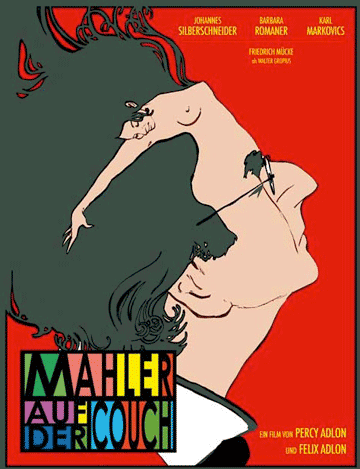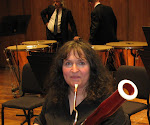
When he began writing Das Lied von der Erde in 1908, Mahler had recently experienced the 3 blows of fate which had been foretold in his Symphony No. 6: he had lost his post as director of the Vienna Opera, his 5 year old daughter had died of scarlet fever, and he had been diagnosed with a fatal heart condition. In July 1908 as he worked on Das Lied, he wrote to his confidant Bruno Walter:
Each of the 6 movements is an independent song, beginning with Drinking Song of Earth's Misery and ending with Farewell. Chinese poems (loosely translated into German by Hans Bethge) were the source of the text for this symphony/song cycle with 2 vocal soloists: mezzo (or baritone) and tenor. Mahler called this work a symphony, although he did not number it, perhaps due to superstition about composers not living past their 9th symphonies. (Das Lied was written after Symphony No.8.) Bruno Walter called Das Lied "the most personal utterance among Mahler's creations, and perhaps in all music."
If I am to find my way back to myself, I have got to accept the horrors of loneliness, since you do not know what has gone on and is going on within me. It is, assuredly, no hypochondriac fear of death, as you suppose. I have long known that I have got to die. . . . Without trying to explain or describe something for which there probably are no words, I simply say that with a single fell stroke I have lost any calm and peace of mind I ever achieved. I stand vis-à-vie de rien , and now, at the end of my life, have to begin to learn to walk and stand.
Although Mahler's score calls for a large orchestra, much of the writing in Das Lied is transparent. Only the first, fourth and sixth songs call for the entire orchestra to play at once. Some passages in Das Lied are more like chamber music, with only a few instruments playing at a time.
Additionally, Das Lied has been successfully arranged for smaller ensembles, most notably by Glen Cortese (2006) and Arnold Schoenberg (begun in 1920 and completed by Rainer Riehn in 1983).
Mahler is one of those composers who had a tendency to extend the limits of his musicians and their instruments. He wrote for the bassoon as though it's an easy instrument to control in low-pitched ppp passages and to play in tune during section unisons on both ends of the instrument. He's famous among bassoonists for writing outlandish trills, some of which are downright impossible. He called upon the bassoons for many different purposes, from mournful to mocking. Mahler probably made each of us better bassoonists by pushing us thus.
Many Das Lied bassoon passages are rather exposed, even in the original full orchestra version. One example may be found at 15 in the 2nd movement (Der Einsame im Herbst - The Lonely One in Autumn) where the bassoon plays with only the violins at first. before the oboe enters:
But the main bassoon solo of Das Lied occurs in the 6th movement:
I think it's a good idea to attempt to really understand who Mahler was in order to prepare for performing his works. Last Sunday the Columbus Symphony presented a private showing of a film about Mahler (Mahler auf der Couch) for the musicians and ticket-holders for this coming weekend's Columbus Symphony performance of Das Lied von der Erde.
This fascinating film explored Mahler's marital drama which resulted in his 1910 session with psychoanalysist Sigmund Freud. Of course, the sound track was to die for (from his 4th, 5th and 10th symphonies). I learned a few things about Mahler from this film. For example, I guess I should be embarrassed to admit that I didn't realize that during his lifetime, Mahler was better known for his conducting than for his composing!
As soon as I returned home from the movie I began researching Mahler's wife Alma and Mahler's famous meeting with Freud. There's really not much known about the details of that meeting, aside from a few clues from Alma. We do know that Mahler's childhood was quite tragic, and it's safe to assume that this was discussed. Mahler's parents bore 12 children, yet only 6 survived beyond infancy, and Mahler's favorite sibling, a younger brother, died in Mahler's arms at age 13. His parents fought bitterly and brutally. During one of their fights, young Gustav Mahler ran out into the street where he came upon an organ grinder playing merrily. This juxtaposition of emotions is key to understanding Mahler's music.
If you live anywhere near Columbus, Ohio, by all means come and hear this weekend's performances of the incomparable Das Lied von der Erde conducted by our Music Director Jean-Marie Zeitouni and featuring two out-of-this-world soloists: Sasha Cooke, mezzo and Anthony Dean Griffey, tenor. (We rehearsed with the soloists this morning and were absolutely blown away by them!)
Masterworks 8:
2012-13 Masterworks Series
Lead
by CSO Music Director Jean-Marie Zeitouni and featuring guest vocalists
Sasha Cooke and Anthony Dean Griffey, this rapturous program includes
one of the Romantic era's most definitive compositions, Tchaikovsky's
moving String Serenade, written as an homage to Mozart, and concludes
with Cortese's orchestration of Mahler's infinitely ingenious
combination of song cycle and symphony, The Song of the Earth.Jean-Marie Zeitouni, conductor Sasha Cooke, mezzo Anthony Dean Griffey, tenor Program: TCHAIKOVSKY Serenade in C Major for Strings MAHLER/CORTESE Das Lied von der Erde ("The Song of the Earth") | 
Venue: Ohio Theatre
Friday
Feb. 22, 2013 - 8 pm
Masterworks Series Sponsor:
 |
Get tickets to this weekend's concerts for just $15! Just use the code EARTH when you order through Ticketmaster.com or the CAPA Ticket Center (39 E. State Street/ 614.228.8600).
.










No comments:
Post a Comment